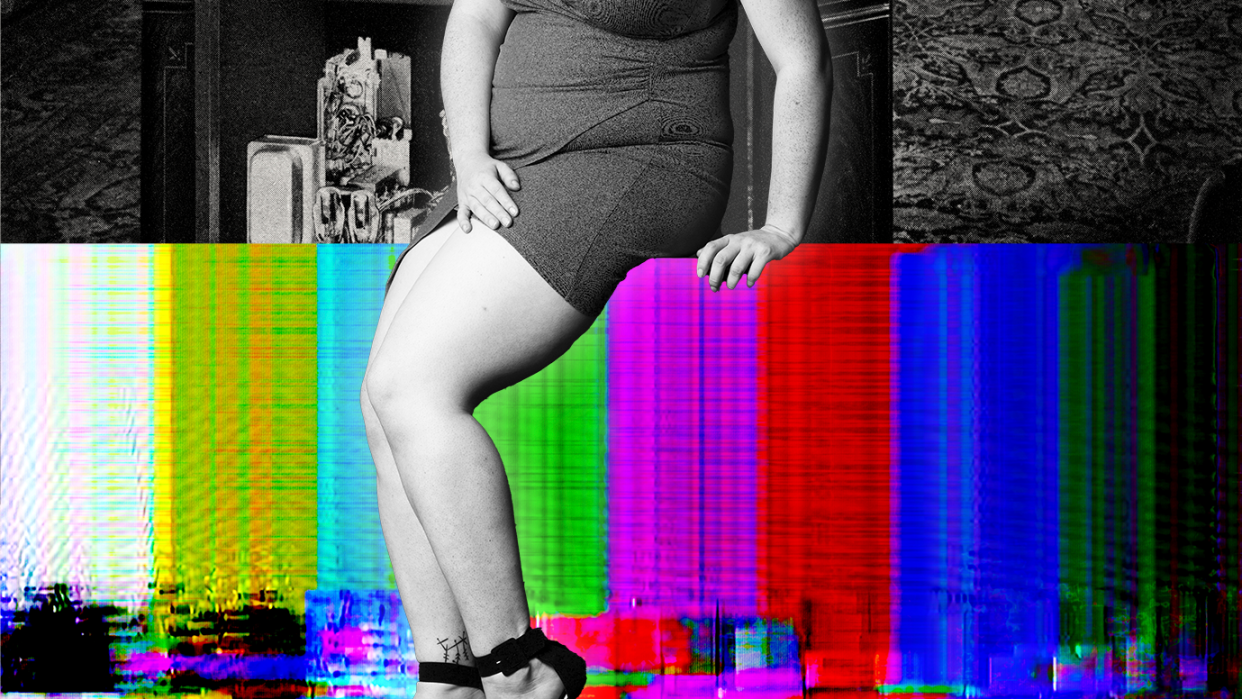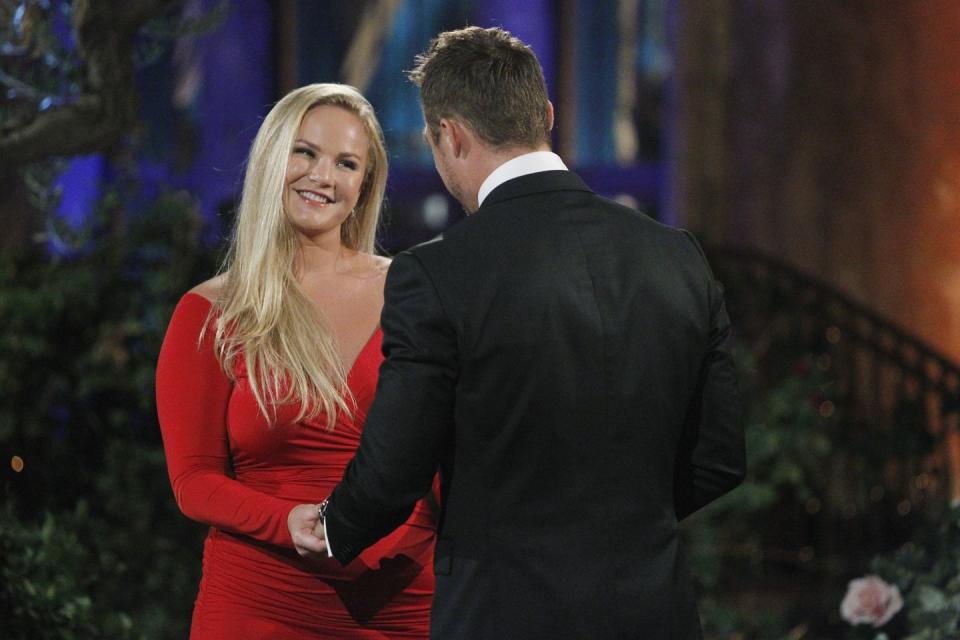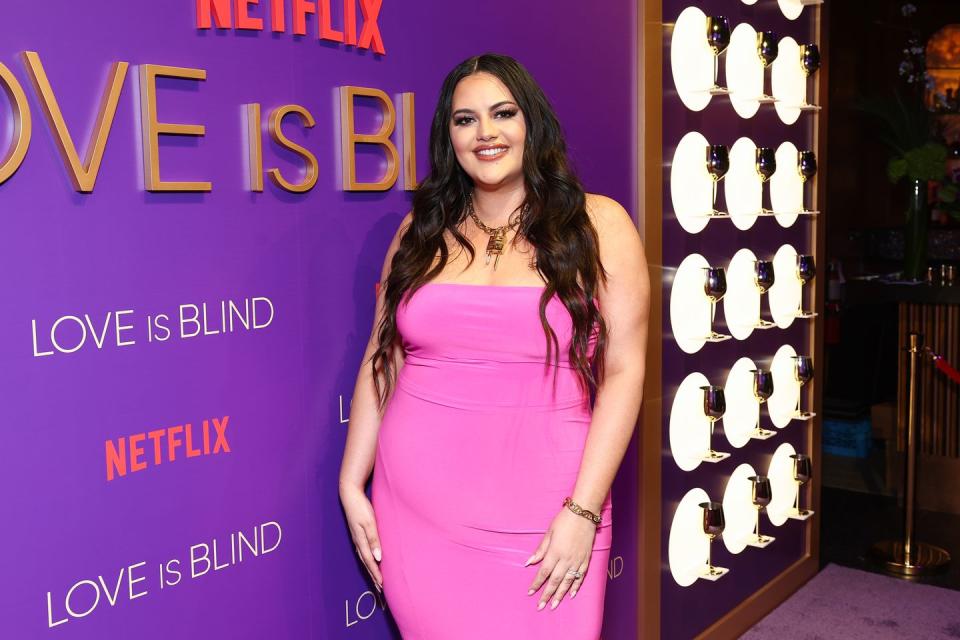Sorry, Reality TV Doesn't Deserve Fat People

When I was about 10 years old, I announced to my mom that I wanted to be a single parent when I grew up. And before you start psychoanalyzing me, I grew up in a perfectly run-of-the-mill household, with parents who have now been happily married for 40 years. Looking back, I have more clarity on why I saw this as my only option: I had never seen anyone who looked like me fall in love.
As someone in a fat body who was constantly told by my peers that no boy would ever like me, true love often felt woefully out of reach. It was easier to embrace my identity as a free spirit and give up the dream of the white picket fence and the cookie-cutter groom topper on a five-tier cake. In a million different ways, people told me romance was not for me, and after a while, I started to believe them. There were, after all, no fat Disney princesses, only fat villains, no fat main characters, just trusty sidekicks and class clowns.
Still, no matter how much I tried to reject the idea that romantic love is paramount, I couldn’t help but get hooked on dating reality TV shows as an adult. From The Bachelor and Too Hot To Handle to Married at First Sight and Love Is Blind, there’s an endless catalog of entertainment that hinges on finding the love of your life through the most outlandish means possible, whether it’s by having all of the options available all at once, putting the horniest, hottest people under one roof to duke it out, or removing looks from the equation entirely. I used to long for these series to showcase more size diversity—part of me still wanted external validation, once and for all, that fat people do deserve love and are desirable romantically, just like their thin counterparts. But over and over again, I was disappointed, as these shows continued to reinforce the belief that we have to be "perfect" (read: thin, conventionally attractive, and usually white) to find our person. After decades of being let down, I’ve come to a different conclusion: Reality TV simply doesn’t deserve fat people.
Let me back up first and give you the sad, sordid rundown of reality TV’s fleeting, ham-fisted attempts at showcasing even a modicum of size diversity. The Bachelor barely tried it in 2015 when it cast plus-size model and professional surfer Bo Stanley, who was swiftly eliminated during week one. Having a cast member on the smaller side of curvy— while not revolutionary compared to what most women actually look like—was sadly a big deal for the show that inspired Roses for Every Body, a fan-led social media campaign calling for fat inclusion on the show (and still, no dice).

Five years later, a new reality show concept hit TV screens; In The Circle, contestants vie for popularity using fake social media accounts, choosing either to portray themselves or someone else entirely. Like many other fat women, I was so excited to finally watch a show that didn’t focus on looks, and even more excited when plus-size content creator Sean Taylor joined the cast. The excitement vanished when she chose to enter the game as a catfish, using photos of a thinner woman, hoping this would help her gain popularity. The Circle isn't technically marketed as a dating show, but it still, at times, drove home the point that certain people in certain bodies have social power while others don't.
Of all the reality shows out there, you’d be hard pressed to find one more perfect for being body diverse than Love Is Blind, a show that aims to prove its title by having contestants date and get engaged without ever seeing what their mate looks like. Season one baited viewers with two plus-size women in the trailer who barely got any screen time, leaving us with Danielle Ruhl, whose particular edit made it seem like all she did was lament her body size. According to Ruhl, producers continuously badgered her about her body image and self-esteem, reportedly asking her while filming if she fears being left because of weight gain or if she thinks her insecurities will scare people away.
Seemingly in response to a wide call for more diverse bodies on the show, producers cast Alexa Lemieux in the second season, who, in her first introduction, said that she could “stand to lose some weight.” In the same season, Abhishek 'Shake' Chatterjee enraged so many of us when he tried to gauge how big his date was by asking if he’d have trouble lifting her up. In the midst of all of this discourse, co-host Vanessa Lachey said that people who fall outside conventional beauty standards were probably just too “insecure” to progress on the show.

If the cast of these shows aren’t the ones exposing their own messed up beliefs around desirability, the internet is. Every single Love is Blind contestant, and not just the women, has been flamed to death about how they look, with an honorable mention going to the most recent season’s Chelsea Blackwell, who was ripped to shreds after comparing herself to Megan Fox.
There’s a version of all of these shows where producers choose to cast fat people, not to mention others who don’t fit the mold of what society deems beautiful. They could choose to represent realistic love stories that, yes, include fat people—because fat people fall in love and have sex and build families and do all the things that smaller-sized people do. But they don’t because that isn’t the story the mass-market audiences want.
These shows have some serious evolving to do if they ever want to move beyond shallowness to become the beacons of true romance they pretend to be — and that starts with those who watch these shows and the people tasked with producing, casting and scripting them. So many people still incorrectly believe we have control over our bodies and the size of them, which emboldens them to shame anyone who falls outside the ideal. Sadly, I think having fat contestants on these shows could give viewers free rein to not only share their fatphobia, but bond over it (and justify it) with their peers. It could cement the belief that it's okay to have unexamined preferences, without any push to investigate why we have them.
For so long, I wanted to believe that seeing more of us on reality shows not about weight loss would condition the world to see us as full people, but the actual reality of it would likely include more body shaming, more accusations of “promoting obesity,” and more justification of who is palatably fat and who isn’t. And at the end of the day, do we need TV shows to prove to the world that we are deserving of love, that we are desirable?
Here’s the good news: Reality TV is an oxymoron in that it doesn’t actually reflect the world we live in at all. Yes, society as a whole is still fatphobic. And yes, there are those who believe the only storylines worth telling about fat people are the ones that require us to change, if not our bodies then our standards of what we deserve.
But our stories are not just riddled with trauma and rejection and sadness. I know now that we don’t need to change to be chosen or to fall in love. What does need to change is a culture that wants to keep seeing our love lives as a joke or an impossibility. I don’t see that changing anytime soon, but I’ll keep watching, just in case.
You Might Also Like

